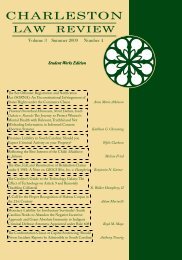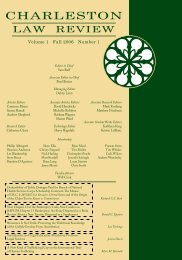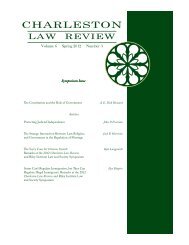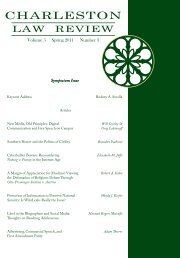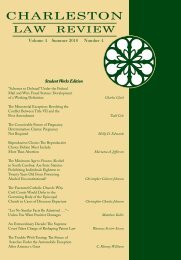Volume 5 Winter 2011 Number 2 - Charleston Law Review
Volume 5 Winter 2011 Number 2 - Charleston Law Review
Volume 5 Winter 2011 Number 2 - Charleston Law Review
You also want an ePaper? Increase the reach of your titles
YUMPU automatically turns print PDFs into web optimized ePapers that Google loves.
SCHULZE FINAL.doc1/20/<strong>2011</strong> 6:14PM<strong>2011</strong>] <strong>Law</strong> School Academic Supportone’s learning outcomes. 217 Relatedness focuses on the degree towhich the pedagogical method promotes the feeling ofinterconnectedness with others and that the learning will lead toa greater ability to use the skills to interact with other people. 218This section analyzes academic support’s impact on these factors.1. Self-Determination Theory Facet <strong>Number</strong> One: CompetenceProviding competence in pedagogical methods cuts both waysin the legal academy. While many students report that lawschool empowers them, many others report being made to feelincompetent and unable to grasp legal doctrine. 219 It may be fairto say that legal educators spend too little time pondering how toinstill in students the feeling of competence. This lack of positivefeedback, coupled with many forms of implicit negative feedback,may hinder students’ success and negatively impact theirpsychological well-being.Studies have shown that positive feedback promotes aperson’s intrinsic motivation to succeed at a given task, 220 whilenegative feedback has the opposite effect by underminingpeoples’ need for competence. 221 Thus, because positive feedbackis so lacking in most law schools while negative feedback is farmore common, any law school pedagogy supplying positivefeedback would be valuable in terms of supporting students’intrinsic motivation to succeed.Traditionally, law school exams, once finished, provided onlysummative—not formative—assessment. 222 The opportunity is217. Id.218. Id.219. Lustbader, supra note 32, at 614.220. Edward L. Deci, Effects of Externally Mediated Rewards on IntrinsicMotivation, 18 J. PERSONALITY &SOC.PSYCHOL. 105, 114 (1971).221. See Robert J. Vallerand & Greg Reid, On the Causal Effects ofPerceived Competence on Intrinsic Motivation: A Test of Cognitive EvaluationTheory, 6 J. SPORT PSYCHOL. 94, 99 (1984).222. WILLIAM M. SULLIVAN ET AL., EDUCATING LAWYERS: PREPARATION FORTHE PROFESSION OF LAW 164 (2007). Summative assessment is feedback thatserves only to inform a student of his or her proficiency in a subject after thecompletion of study. Id. Formative assessment, by contrast, is feedback in theintermediate stages of learning seeking to provide learners with guidance on321



